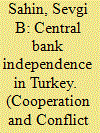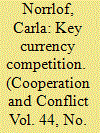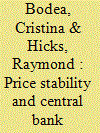| Srl | Item |
| 1 |
ID:
112414


|
|
|
|
|
| Publication |
2012.
|
| Summary/Abstract |
The Turkish state has been going through a neo-liberal transformation resulting from the strategic reorientation of state institutions in ways that enhance and facilitate the strategies pursued by market-oriented social forces. The reform that granted legal independence to the Turkish Central Bank (TCMB) in 2001 was an institutional turning point within the state structure in Turkey; this policy shift prohibited TCMB's granting of credits to the Treasury and other public institutions. Institutionalization of an anti-inflationary approach to macro-economic policy altered the power balance not only between different state agencies, but also between social groups in favour of financial interests that benefited from monetary stabilization. Rooted in a neo-Gramscian framework, this article explores the legal independence of the TCMB as a function of the market-oriented domestic social forces that emerged as a result of the process of neo-liberal globalization initiated in the 1980s. The article also emphasizes how the hegemonic unification of diverse identities and interests around the strategy of achieving price stability was crucial in the autonomy of the TCMB.
|
|
|
|
|
|
|
|
|
|
|
|
|
|
|
|
| 2 |
ID:
092879


|
|
|
|
|
| Publication |
2009.
|
| Summary/Abstract |
In this article, I investigate whether the euro is set to eclipse the dollar as the world currency. Although the euro has gained in importance at the expense of the dollar in all key currency functions, I argue that it is not about to replace the dollar as the unique currency of global importance. Notwithstanding America's current weakness, I argue that different preferences for monetary and fiscal policy inside the euro-zone, and the need to coordinate these, will make it difficult to accommodate and correct large-scale imports over the long term. I also find that taking on the role of the world's preferred import destination is bound to exacerbate internal differences and complicate decision-making.
|
|
|
|
|
|
|
|
|
|
|
|
|
|
|
|
| 3 |
ID:
139788


|
|
|
|
|
| Summary/Abstract |
Despite mixed empirical evidence, in the past two decades central bank independence (CBI) has been on the rise under the assumption that it ensures price stability. Using an encompassing theoretical approach and new yearly data for de jure CBI (seventy-eight countries, 1973–2008), we reexamine this relationship, distinguishing the role of printing less money (discipline) from the public's beliefs about the central bank's likely actions (credibility). Democracies differ from dictatorships in the likelihood of political interference and changes to the law because of the presence of political opposition and the freedom to expose government actions. CBI in democracies should be directly reflected in lower money supply growth. Besides being more disciplinarian, it also ensures a more robust money demand by reducing inflation expectations and, therefore, inflation. Empirical results are robust and support a discipline effect conditioned by political institutions, as well as a credibility effect.
|
|
|
|
|
|
|
|
|
|
|
|
|
|
|
|